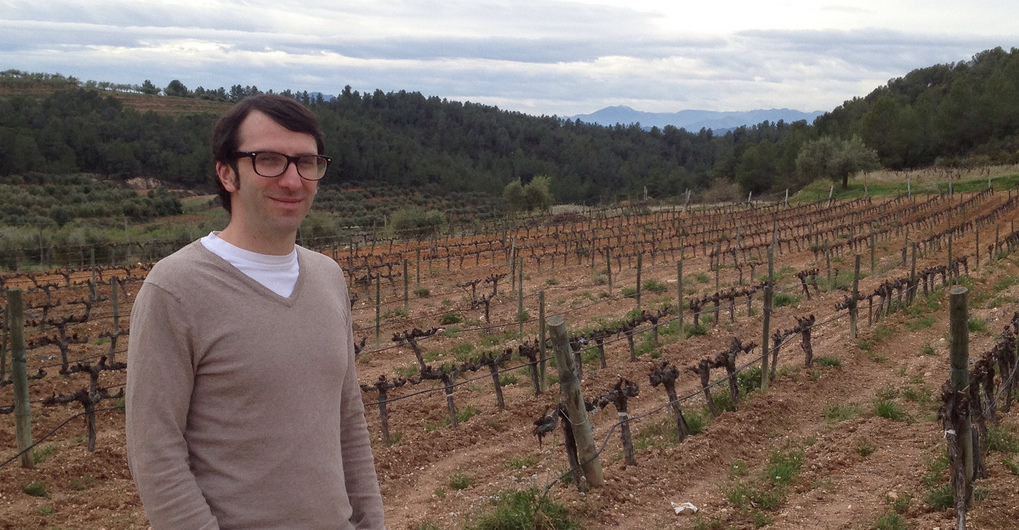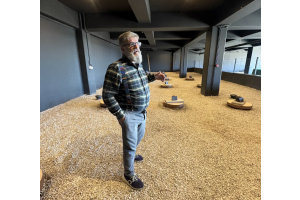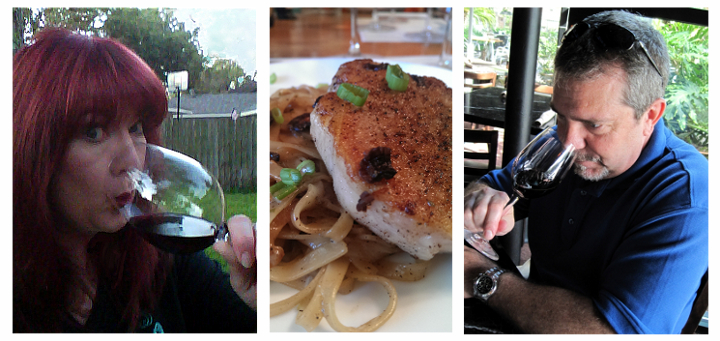
What's with "Another Wine Blog"? Well, like the site says, "Because Another Wine, Food, Beer and Travel Blog would have been way too %#&@ing long!" For the first time in the history of our SpeakEasy series of blogger interviews, we talk to a couple: Amy Corron Power and Joe Power. From West Virginia to choosing wine over golf to grapevines like manhole covers, get to know this dynamic duo.
How does someone raised by teetotalling parents in West Virginia come to be so into wine that you’re driven to blog about it?
Amy: I don’t know that I am driven to write about wine specifically, as much as I am driven to write. I started writing in grade school. Later, I worked in print in the 80s and 90s. I’ve been writing on-line since 1999. I started with college sports, mainly football. Joe and I had a college sports website when we lived in Toledo, Ohio that got up to 60,000 hits a day at its peak in 2001. We had no idea what we had at the time. We just saw something lacking in the way college sports was covered by traditional print. It all read like stat sheets strung together with a few sentences and it was missing the fans’ perspective. So we rose to the challenge. We just did the same thing with wine. But with wine there is no off-season.
I was always the rebel kid. When I first started buying wine in my 30s, I would hide all the bottles in the cabinet under the bathroom sink when my parents came to visit me. I did not start blogging about wine until after my father died. At first my mother frowned on it, until we went to Santorini, Greece, followed by Montpellier, France, on region-sponsored wine media trips. Then she started sending links to the blog to all her friends.
(Here’s a picture I took in Santorini at Oia.)
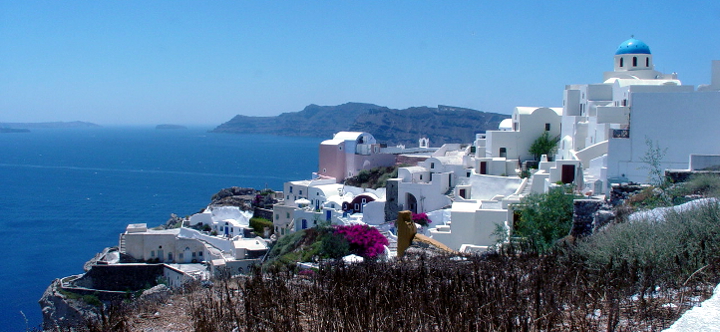
Are lawyers really into wine? Does it come up in conversation a lot?
Amy: One of my law professors, John A. Barrett, Jr. , who first introduced me to fine wine and wine tasting, told me, “If you’re going to be a lawyer you either need to play golf or know about wine.” I just wasn’t into golf. Houston is a small town when it comes to the wine world. Most people I work with know I’m into wine, so they ask me questions about pairings and suggestions for places to visit in Napa or Sonoma. We also host First Friday tastings, and at least one-third of the participants are lawyers. The law is ancient, yet alive and constantly changing (contrary to those who think we should interpret The U.S. Constitution as static and verbatim). Wine is a lot like that.
Since you read all press releases/PR pitches, any thoughts on what makes one effective from your perspective? Even those that start “Dear Steve?”
Amy: While I do read all of the press releases and pitches, I do not always read them all as soon as I get them. I get about 1,000 emails a day and am usually reading them on my phone, so an effective release sent via e-mail has a subject line that stands out and a lede paragraph grabs my attention, even if it might piss me off like “Survey says Consumers wary of blogger recommendations.” The best press releases are targeted toward the medium, and indicate the person sending the release has done his or her homework. Give me something unique or that might look at a different angle. Anything that shows a commonality with the publication or that of its authors is important.
The WORST press release will send us some “Great New iPhone App” to review that isn’t available on Android. That is beyond obtuse since we explicitly address that on our Media/PR Inquiries page.
I was really moved by you post about the moment you felt like a mom rather than a stepmom. What advice would you give other people in this situation? And though you have a wine blog, do you also see it as a platform to discuss things more personal as well?
Amy: To me there is a difference between wine writing and wine blogging. I’ve been writing for years. I went to Journalism school. I learned all the mechanics of good writing, and I was a good writer. But my writing had no soul, because I was afraid to put myself into the story. Back when I joined Joe in writing Another Wine Blog in 2008, Joe was the creative voice and I was the “print” voice – the trained journalist who took all day to write something because I wanted it to be “perfect,” to the point that it was nothing but a collection of words on a screen.
Joe challenged me to “blog” and put my feelings out there; to write from the heart, more than just my head. It was scary at first. But “personal” is what readers connect with, because that is how they live. A Blog is not just a platform to discuss things more personal, but it’s the discussion of the more personal that makes something a “blog.” I don’t read too many blogs regularly – but the ones I do, it’s because they make me feel something authentic when I read them. I try to do the same.
As far as advice for a stepmom: Don’t try to compete with or replace your stepchild’s mother. Once you accept that you’re an additional parent you’ll start feeling like a real one.
Joe: I see my world as revolving around food and drink. They are essential to my life, the lives of my family and friends, and the centerpiece of any civilized gathering. So when I write about food and drink I naturally talk about anything and everything that comes to mind...life.
There is not much that comes to mind that is more boring than technical details about wine. That is of interest only to winemakers and geeky folks who enjoy discussing wine on that level. I prefer to write for people who love to drink wine.
As a web designer, do you have strong feelings about wine labels? Winery websites? What makes a good label/website and what makes you cringe?
Joe: I have to admit two things right off the bat, the first one is that I only pay attention to the art on a label if it is amazing or if it is stupendously bad. Most of the time, I just hope that if the wine is memorable the label will be too so that I recognize it when I see it again. My second confession is that I do not spend much time looking at winery Web sites.
For labels, I don't think that there are real rules, but trying to match the label to the wine inside is probably a good rule of thumb. Don't choose your label by committee. I have yet to see any reasonable design decision come from a committee, much less anything good. Don't listen to consultants; most of them don't know anything other than buzzwords. They're like Mel Kiper, Jr. If they know so much, why isn't someone paying them to do what they talk about?
Winery Web sites tend to be a lot like restaurant sites in so far as there seems to be an accepted style that very few are willing to deviate from. To the best of my knowledge, no one has ever done any sort of study to gauge the effectiveness of this particular aesthetic, but from my experience there is a certain ubiquitous quality to most wine sites. While none of my clients are wineries, I think if I did take one on I would advise them to focus on their wines in an experiential way and tell their stories. Even knowing what I am looking at, I don't much care about the technical details of the wine. Can you imagine what the average consumer thinks of those?
As for what makes me cringe, these things apply to graphic design in general. Improperly chosen fonts, lack of whitespace, use of jargon that impresses peers but confuses the visitor to the site; those are all things that make me wince with an almost physical pain. Then there are the people who design and build for their pet platforms. A word of advice for anyone looking to hire a designer/developer for your site or application, if the person you are talking to says that they will be using something like SharePoint as a platform, or that they will first build for iPhones and iPads and then worry about Android later, kick them out of your office immediately. If you've already hired that person, fire them. They are unqualified, and you will suffer greatly as a result.
[Find out Amy and Joe's favorite places for food and wine in and around Houston.]
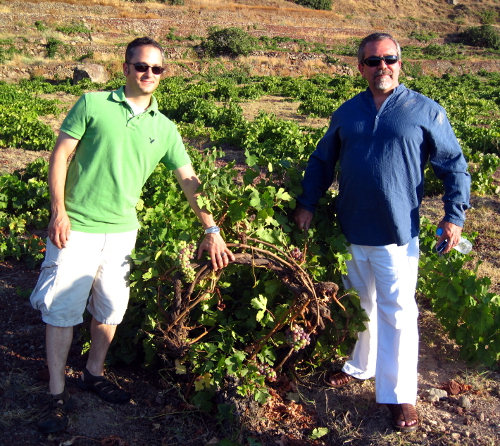 Is it possible to go to Santorini and not lift up Assyrtiko vines like they were a manhole cover?
Is it possible to go to Santorini and not lift up Assyrtiko vines like they were a manhole cover?
Joe: As that has been one of my primary goals in life from the time I was a child, it is inconceivable to me that you would even consider this a question. How could you not? What if someone had hidden a perfectly chilled bottle of Sigalas under the vine?
Amy and Joe, I’m putting you two in charge of a panel for WBC15 that will address all your objections to the print writers’ panel of WBC14. Who would be on it and how would it operate?
Amy: First and foremost it would need to be composed of panelists who respect, support and encourage blogging and bloggers as peers, rather than usurpers or the proletariat, and it would need to reflect the diversity of the audience. It should be a discussion and dialogue, not a one-to-many lecture. I would like to see a panel of bloggers from different backgrounds compare and contrast how they might write about the same winery, from the perspective of the PR person, the tasting room sommelier, a consumer, the winemaker, a wine club member or a media person invited for a visit.
Joe: I don't object to print writers at all, and I sincerely wish that there were many more of them. I do object to print writers like Steve Heimoff, who have been contemptuous and condescending towards bloggers from day one, being brought in to lecture bloggers on, what, blogging? I object to a panel of print writers, one of whom seems little more than a muckraker with questionable ethics, who don't seem to know, or even care to know, to whom they are speaking. And the two things that I most strongly object to are that a) the organizers of the conference feel that it is appropriate to bring in three older, white, male writers to speak to an increasingly diverse group has always been, and I am guessing here, at least 50% women, to b) tell bloggers how to be better print writers. This has been the attitude of the little clique that thinks that they make the rules for the rest of us. Now don't get me wrong, I don't think that older, white, males, despite all evidence to the contrary, are evil, after all I am one...wait, that's probably not helping with my argument so I'll move on to the rest of the question.
It's tempting for me to put myself of the panel, but instead I would want someone who I think understands what blogging really is and what it isn't, someone who also understands the technology involved, and someone who has the balls to stand up for the rest of us if need be. There a few folks I could think of, but since he makes me laugh a lot, I'd go with Joe Roberts to represent bloggers. Then I think it would be crucial to find someone who understands how both worlds, print and online, work. Someone with the knowledge and empathy to know where the two can and should intersect. That person should also have big, if metaphorical, cajones. My choice also, probably not coincidentally, makes me laugh at least as much as Joe does; I would love to see Marcy Gordon speak on such a panel. There are a lot more bloggers that I'd like to see speak on any number of topics, including this one, but I think any more than three speakers might require more than the normally allotted 60 minutes. The third slot I would like to see filled by a print writer. Given that I read so few of them anymore, I don't have any specific person in mind, however I would fill it with one of two types. I’d prefer a person who has great curiosity about blogs, bloggers, and blogging. If all that’s available is a condescending jerk like some we’ve already seen...I'm afraid that Joe Roberts might come down with the flu and I'd have to step in for him.
You’ve attended every WBC since Santa Rosa, save Penticton. How has the conference changed and where would you like to see it go?
Amy: Over the years the three-day Wine Bloggers’ Conference has gone from a strong host region focus with a few outlier events to an outside region sponsored conference that just happens to be located in a wine region host city. I’d like to see WBC return to its roots and focus content entirely on the host region. Let me expand on that…
When WBC started in 2008 content focused primarily on new bloggers, because that’s what most of us were. So the seminars focused on ethics, monetizing and increasing traffic to your blog. There were visits to wineries or vineyards on all days. There was a big focus on the regions with only one Outside the Region (OTR) sponsor. 2009 was amazing, with primary focus on the regions visits to CIA at Greystone, and breakouts more of an afterthought. Since breakouts still targeted new bloggers that was just fine with me. Then in 2010 there was a big shift – it seemed like the region became secondary with many more breakouts and more outside regions hosting events and pouring wine. The regional events become pre- and post- excursions for an extra fee, which also meant extra hotel costs. By then we were getting small-group invites from wineries to non-conference lunches are winery visits – so we didn’t lose anything – but those events are invitation only and limited to a select few.
I would like to see the primary focus of WBC return to the host region to include trips to multiple wineries and vineyards on both full days of the conference, and seminars focusing on the AVAs in every time slot (not all in the same time slot). I would like to see a three-track program, for new, intermediate and advanced bloggers. I would like to limit the outside regions to hosting after parties and hospitality suites. Lunches, dinners, receptions and any live blogging or pouring sessions should be focused on just the host region. I think WBC is moving in that direction, the organizers just might need a local partner to spearhead. I understand there was a fantastic effort for that in Penticton, which unfortunately we couldn’t attend.
Then there are the Wine Blog Awards (WBAs) … which distract the WBC from the region focus.
From the beginning, the Wine Blog Awards’ “ceremony” was lightly attended, so it didn’t really interfere with sponsored regional events. Maybe that’s why they moved it to the Saturday night dinner – so they would have a captive audience. No matter how it’s spun: it’s a lather, rinse, and repeat. While there is nearly always a diverse group of finalists, it seems many of the same authors win year after year. That has made it outright panned by many bloggers. Seasoned bloggers accept invitations to have dinner with individual winemakers or just go have dinner on their own. We call it #goingrogue, and even tweeted with the hash tag this last year.
I think the WBA-focus of the dinner needs to change. Forcing attendance by making it the centerpiece of the Saturday night dinner just annoys people, and decreases attendance. It is not fair to the Regional winemakers who pay to have their wines served. The WBAs are not “all inclusive” of the wine blogging community – and therefore they should not dominate the WBC. Few take them seriously – they should either be discontinued all together, or at the very least moved to an afternoon or some time other than the central focus of Saturday night. The Finale Dinner should be about the host region and the wine.
Joe: I think that the organizers have become better at a lot of the little things that have made for a better experience. I was surprised and very happy to see how the age range and racial diversity both seemed to have increased dramatically. On the other hand, as both Penticton and Virginia showed, the choice of location is not always based on what is best for the wine blogging community. As “veteran” attendees (despite what one blogger thinks the word “veteran” means) I think both Amy and I would agree that the West Coast destinations have all been fantastic, and revisiting any of them would be great. I'd also love to see it in Paso Robles.
From my experience, the more proven wine regions, and I am including Washington and Oregon in that group, should be where the conference is held. I'm trying to keep an open mind about New York, but if it is ever held in some of the questionable places the organizers recently polled us as potential destinations, my participation will end completely. They could literally hold it in my back yard and I wouldn't attend one in Texas. Beautiful scenery, great food, and nice people are all necessary for a great conference, but even more important is access to great wine and to the people who work in all aspects of the wine industry. That can't happen away from where they make the great wine.
